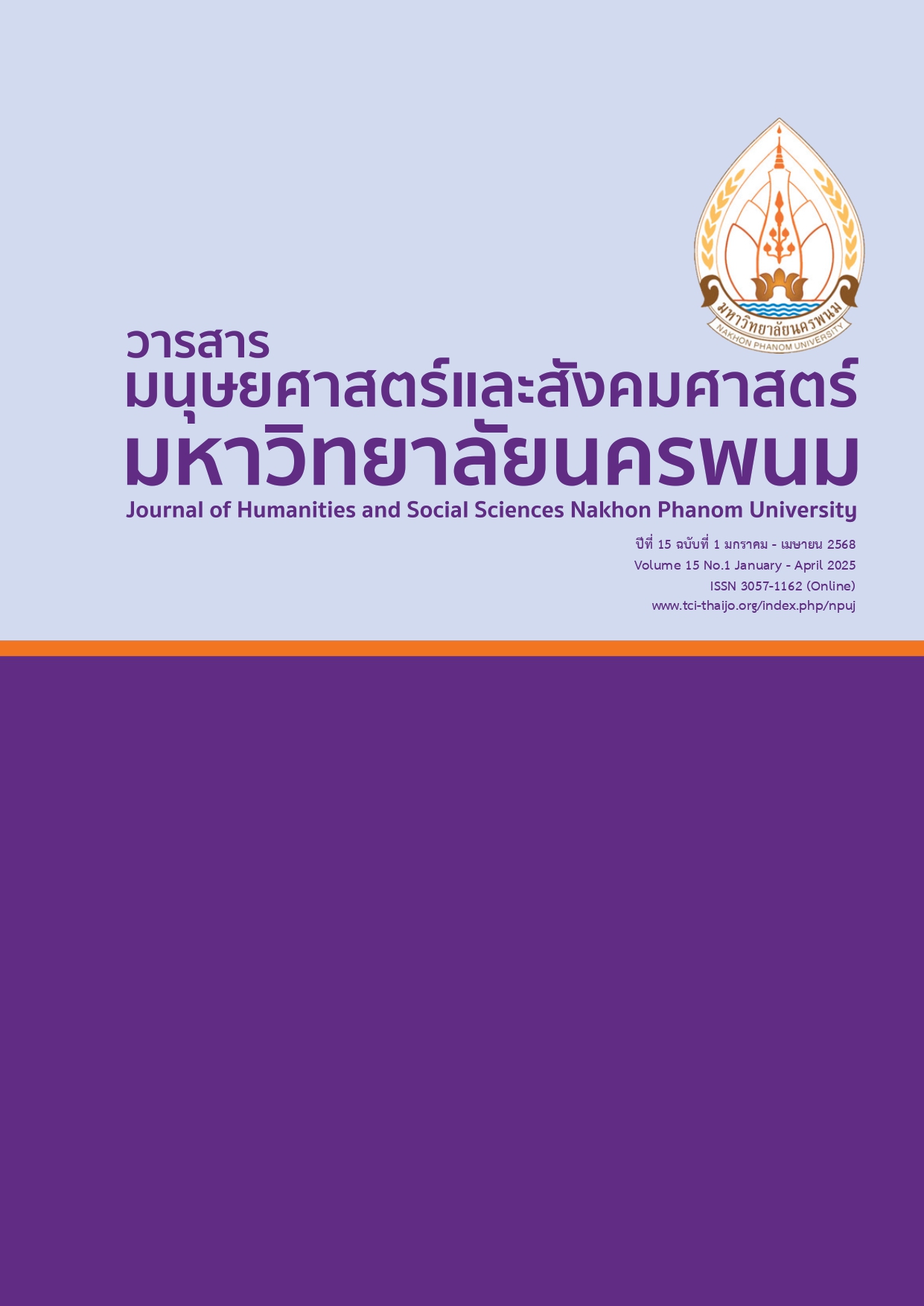The Knowledge and Understanding about Online Sales Tax of People: A case study of Nakhon Phanom Province
Main Article Content
Abstract
This research aims to study the knowledge and understanding of tax compliance and analyze the factors affecting tax compliance, as well as propose guidelines to improve people's tax knowledge in Nakhon Phanom Province regarding online commerce tax. A mixed-method approach was employed as a research methodology. The target group was selected through purposive sampling, consisting of 150 online business entrepreneurs for responding to questionnaires and 10 entrepreneurs participating in in-depth interviews. Research tools included questionnaires and in-depth interview form. Data was collected from academic documents, related research, surfing the internet, questionnaires, and in-depth interviews. The data analysis utilized qualitative methods to explore the people's knowledge and understanding of online commerce-related taxation in Nakhon Phanom Province.The findings revealed that 1)online business entrepreneurs had a moderate level of knowledge about VAT, with an average score of 3.5. The average score for tax filing was 3.6, and business registration was 3.4, but there was confusion regarding VAT calculation and withholding tax. 2) Key factors influencing tax compliance among entrepreneurs included tax knowledge, ease of tax payment, and government support, with an average score of 3.7 for online tax filing. 3) Guidelines to improve tax knowledge should focus on training programs and the development of accessible media for public relations, such as websites or mobile applications provided by the Revenue Department, to enhance the accessibility or people who engage in online commerce.
Article Details

This work is licensed under a Creative Commons Attribution-NonCommercial-NoDerivatives 4.0 International License.
References
Allingham, M. G. & Sandmo, A. (1972). Income tax evasion: A theoretical analysis. Journal of Public Economics, 1(3-4), 323-338. https://doi.org/10.1016/0047-2727(72)90010-2
Alm, J. (2021). What motivates tax compliance?. Journal of Economic Surveys, 35(3), 663-688. https://doi.org/ 10.1111/joes.12272
Bandura, A. (1977). Self-efficacy: Toward a unifying theory of behavioral change. Psychological Review, 84(2), 191-215.
https://doi.org/10.1037/0033-295X.84.2.191
Bandura, A. (2018). Toward a psychology of human agency: Pathways and reflections. Perspectives on Psychological Science, 13(2), 130-136. https://doi.org/10.1177/1745691617699280.
Bott, K. M., Cappelen, A. W., Sørensen, E. Ø. & Tungodden, B. (2020). You’ve got mail: A randomized field experiment on tax evasion. Management science, 66(7), 2801-2819. https://doi.org/10.1287/mnsc. 2019.3390
Braithwaite, V. (2022). Tax compliance theory and the shifting perspectives of compliance research. Public Administration, 100(4), 755-771.
Brynjolfsson, E. & McAfee, A. (2020). The second machine age: Work, progress, and prosperity in a time of brilliant technologies. W. W. Norton & Company.
Johnson, R. B. & Christensen, L. B. (2022). Educational research: Quantitative, qualitative, and mixed approaches. Sage Publications.
Kirchler, E., Kogler, C. & Muehlbacher, S. (2014). Cooperative tax compliance: From deterrence to deference. Current Directions in Psychological Science, 23(2), 87-92. https://doi.org/10.1177/096372141351 6975
Laudon, K. C. & Traver, C. G. (2020). E-Commerce 2020-2021: Business, Technology and Society, Global Edition (16th ed.). Pearson Higher Ed.
Nguyen, A. N. & Simkin, M. G. (2021). The impact of digital taxation on small online businesses: A global perspective. Journal of Business and Economic Perspectives, 52(1), 22-38.
OECD. (2021). OECD Economic Outlook. OECD Publishing. https://doi.org/10.1787/edfbca02-en.
Office of Commercial Affairs Nakhon Phanom Province. (2021). Report on the online trade situation in Nakhon Phanom Province. Retrieved January 2025, from https://nakhonphanom.moc.go.th/.
Prasertsri, C. (2023). The impact of changes in online sales tax policy in Thailand. Journal of Community Development Research, 15(4), 22-30.
Poonsub, P. (2022).Tax knowledge and understanding among rural entrepreneurs: A case study of Northeastern Thailand. Journal of Local Economics, 8(1), 45-55.
Radu, D. & Florea, D. (2022).The role of digital literacy in tax compliance: A study of online businesses. Economics and Business Review, 8(2), 45-60.
Ramang, K. & Sookasukhon, P. (2024). Knowledge and understanding of personal income tax payment among online store operators in the jurisdiction of the Bangkok Area Revenue Office 29. Journal of Business Management for Local Development, 11(1), 127-142. https://so06.tci-thaijo.org/index.php/JMDU BRU/article/view/275443/184009
Richardson, G. & Sawyer, A. (2020). Tax compliance: A review of the literature. Journal of Tax Research, 12(3), 225-241.
Smith, J. (2021). The impact of digital marketing on consumer behavior. Journal of Marketing Research, 15(3), 45-60. https://doi.org/10.2478/sbe-2024-0027
Sirivattanakul, N. & Kanchanapithu, W. (2024). The use of digital media to enhance tax knowledge among online SME entrepreneurs. Journal of Business Administration Innovation, 10(2), 18-26.
Tapscott, D. (2020). The digital economy: Promise and peril in the age of networked intelligence. McGraw-Hill Education.
The Revenue Department. (2022). Tax for online commerce: A guide for online entrepreneurs. The Revenue Department.
The Revenue Department. (2023). Online tax registration manual for entrepreneurs. Retrieved January 2025, from https://www.rd.go.th
Thongsap, N. & Rueraeng, R. (2024). Problems and obstacles in collecting online business taxes in Thailand. Western University Law Journal, 8(2), 1-15. https://doi.org/10.14456/jeir.2024.60
Vroom, V. H. (1964). Work and motivation. John Wiley & Sons.
Wenzel, M. (2021). Misperceptions of social norms about tax compliance: A field experiment. Journal of Economic Behavior & Organization, 183(8), 220-237. http://hdl.handle.net/1885/41626


